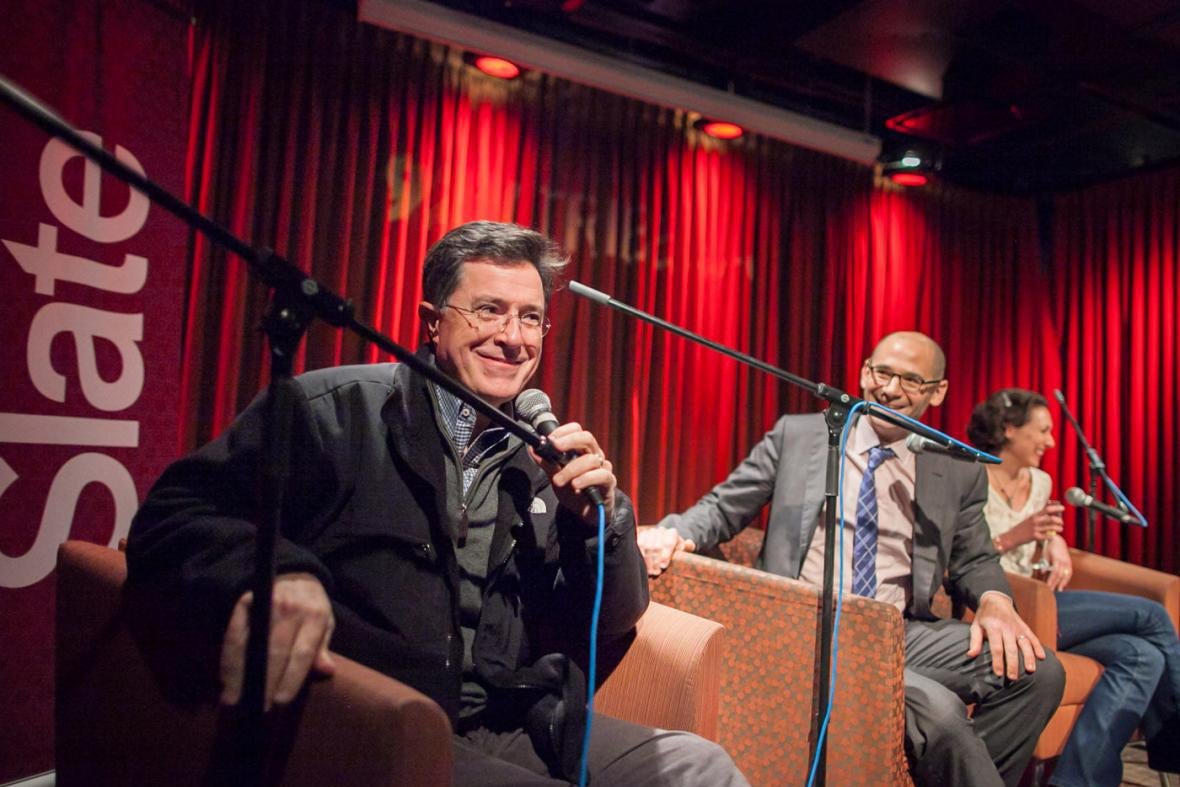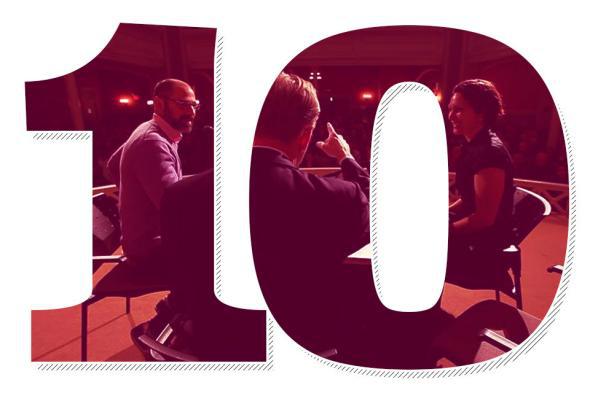Around Slate this month, we’ve been congratulating Emily Bazelon, John Dickerson, and David Plotz on a major milestone. It’s been 10 years since they teamed up on a weekly political podcast that’s become as much a part of the magazine’s essential voice as any individual article or writer. It was voted the favorite political podcast in iTunes, and once on The Colbert Report, Stephen Colbert told the world that “everybody should listen to the Slate Political Gabfest.”
But it’s a little tough to host a true celebration without addressing one nagging question: When did the Slate Political Gabfest in its current form actually begin? It’s a topic listeners, and even those of us who were there at the beginning, have debated for years. The question is more akin to asking when your child said her first word than when, say, a sitcom premiered on NBC. The birth of the Gabfest was a process, not a true debut. The show that today is a Friday-morning staple for hundreds of thousands of people began as a lark, an attempt to capture the way Slate’s writers and editors actually talked to each as they assembled the online magazine.
The simple and irrefutable answer is, the Gabfest started in 2005. Or maybe the beginning of 2006.
The very first Slate podcasts were—let’s be charitable—unambitious. They consisted of yours truly reading Slate articles out loud. Here’s the very first one, a piece about efforts to combat shoplifting, posted on July 15, 2005.
Fairly quickly after launching these “minibooks-on-tape,” we realized it would be fun to start hearing from Slate personnel other than just me. I was living in Los Angeles at the time, and I’d noticed that our weekly editorial conference calls were far more interesting and entertaining than many news shows I heard on radio or TV. So on a trip to the Slate D.C. office, I grabbed one of our newest staff members at the time, the dashing, funny, and brilliant political writer John Dickerson, and asked him to corral fellow staffers Timothy Noah, Jack Shafer, and one David Plotz into a conference room. It happened to be Oct. 28, the day Dick Cheney’s chief of staff Scooter Libby was indicted by special counsel Patrick Fitzgerald in the Valerie Plame/Joe Wilson leak investigation. I pointed them toward a few microphones I’d set up and said, “Discuss.” I still recall my own incredulous glee that I could simply drop a few mics into a room and call it a radio show. I’d spent 20 years at NPR, where such an improvised setup would have been unthinkable.
Apparently we liked the result of this experiment, because the very next week, on Nov. 4, there were John and David again, along with Will Saletan and Jack Shafer, back for a second roundtable show. George W. Bush had just nominated Samuel Alito to the Supreme Court, but the big news for our story today was the name of this episode: The “Friday Political Gabfest.”
As I recall, we settled on the word Gabfest because it signaled a show that would be different from the political talk shows then ubiquitous on the airwaves. This podcast would be informal, honest, irreverent, and unafraid of four-letter words, more like a conversation at a bar after work than a formal news program.
The name stuck, but since we imagined it as a rotating roundtable of Slate writers, the guests kept changing. On Nov. 11, Dickerson hosted Plotz and Dahlia Lithwick; on Nov. 18, Mickey Kaus and, in her first appearance, Emily Bazelon.
Then, on Dec. 2, 2005, the magic happened. John Dickerson welcomed Emily Bazelon and David Plotz in their first appearance together on the Political Gabfest. The full episode clocked in at a tight 12 minutes and 39 seconds (far short of today’s more typical 45 minutes).
The rest was not quite history, because the groupings kept rotating over the next few weeks that December, and apparently we all just decided to take the holidays off. It wasn’t until Feb. 2, 2006, that John, David, and Emily reunited on the show. And that’s when something about this particular trio just seemed to click. Listeners told us they loved the grouping, and I recall the hosts themselves telling me the chemistry felt right. The Gabfest, as we know it today, was here to stay.
There have been lots of milestones along the way, including the first time we attempted a live taping. It was January 2009, just before Barack Obama’s first inauguration. We knew there would be swarms of politically energized visitors descending on Washington, so we took a chance and booked a hall. Could we persuade a few of those people to show up and watch three journalists talk into microphones on a stage, or would we be playing to crickets?
Despite the full house at Sixth & I, John, David, and Emily sounded a little tentative as they took to the stage, which you can hear in this clip from before the actual show started (they’ve since become live show pros):
For 10 years, the show has remained remarkably stable (save for when John turned over primary hosting duties to David on March 4, 2011). It’s still a reliable companion, guiding listeners through the turbulent American political scene, despite the fact that all three hosts have seen their careers grow and evolve during that time. David Plotz was Slate’s deputy editor back in 2005. He later became editor in chief, and then, to my momentary horror, announced in 2014 that he was leaving Slate. He quickly assured me he’d be staying on as host of the Gabfest, and he continued even as he took a new position as CEO of Atlas Obscura. Also that year, Emily Bazelon left Slate to take a job at the New York Times Magazine. Same momentary heart palpitations, same reassuring pledge to stay with the podcast. And then earlier this year, John Dickerson was appointed to one of the most prestigious posts in television news: host of CBS’s Face the Nation. Not only did John agree to remain on the Gabfest, but he even launched a spinoff show, the fantastic political history podcast Whistlestop.
I won’t chronicle a list of the many highlights from the Gabfest’s first 10 years, but there was one moment we all like to recount over drinks. It was the day we were late posting the show for some reason, and David Plotz got a phone call from an annoyed listener who said his Friday morning routine depended on his regular Gabfest fix. When the listener identified himself, Plotz thought it was a crank call. But it actually turned out to be Stephen Colbert.
After several years of invitations, Colbert finally had time to appear as a surprise guest on a live Gabfest show in New York on March 22, 2013. Listen to the audience reaction as they figure out who’s walking onto the stage.
(Full episode, Colbert section at 52:22)

So whether we peg the inaugural Gabfest as Oct. 28, 2005; Nov. 4, 2005; Dec. 2, 2005; or Feb. 2, 2006, it’s still the right time to wish Emily, John, and David a happy birthday, and an even better second decade. Given the increasingly insane turns in the 2016 election, I for one am endlessly grateful to have a downloadable dose of sanity in my podcast app every Friday morning.
Editor’s note, Dec. 10, 2018: Select clips from the Slate Political Gabfest’s first 10 years were restored.
